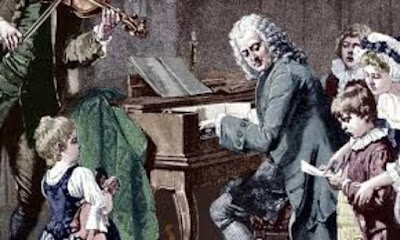Music Matters: The Bach Effect*
Introduction:
Music helps electrical activity in newborn children’s brains to resonate—laying the neural pathways that create a better foundation for learning a variety of cerebral skills. The relationship between music and brain development is significant at many levels. Dr. Rebecca Shore's Developing Young Minds: From Conception to Kindergarten devotes almost one third of her book to this theme.Bonding at its Best
Dancing to music with your baby
before they begin to crawl is a natural inclination for parents, and they couldn’t
be more right. By being exposed to a variety of pitch, tempo and rhythm, the
baby will absorb variations in cadence—layers of complexity in pattern
recognition—through the
 |
| Hey, Mr. Bach—could you play this in D major? |
The Universal Language: Music
Music is often referred to as the universal
language. In fact, most likely, musical expression preceded speech. Regardless of what language we speak or culture we were raised in, music can make us feel
elated, depressed, calm, and can reduce us to tears.
Music Affects Human Emotions And Our Brain
Music is more complex than language—notes usually involve several sounds at the same time—requiring readers to discern their meaning vertically (harmony) as well as horizontally (melody). We don’t see two or three letters piled on top of each other in a book, but in music this is normal. And sometimes, musical notes are produced by upwards of fifty different sounding instruments in a band or orchestra—all at the same time! |
| Bach's Blue period... |
Over the history of Western music, there have emerged two distinct categories—complex and simple, or polyphonic and homophonic. I will focus on complex music here as it is best for the child from conception to kindergarten—the entire point of this article.
Multifaceted music, or polyphonic music, includes many notes or melodies sounding simultaneously. The human eardrum receives the vibration of the sound wave of the pitch—translating the message to the brain, which understands it...voila!
Multifaceted music, or polyphonic music, includes many notes or melodies sounding simultaneously. The human eardrum receives the vibration of the sound wave of the pitch—translating the message to the brain, which understands it...voila!
Polyphonic music emerged in the Middle
Ages (900–1450) growing in intricacy throughout the Renaissance period (1450–1600).
Instrumental music (without voices) became popular in the Baroque Era
(1600–1750). It was during this period that polyphonic music developed a
tightly knit technique for composers that adhered to a strict, far-reaching structure
based on mathematical principals—driven by the equations of vibrations per
second of various pitches of notes and their relations. This technique was
called ‘counterpoint’, and Johann Sebastian Bach (1685–1750) is considered the
greatest genius of Baroque counterpoint music.
Many consider the contrasting style of true polyphony to have reached
its very pinnacle of perfection at the hands of Bach’s pieces. Bach’s fugues
probably represent the most elaborate counterpoint compositions ever created.
- Middle Ages: 900–1450
- Renaissance Period: 1450–1600
- Baroque Era: 1600–1750 — Johann Sebastian Bach (1685–1750)
- Classical Period: 1750–1830 — Wolfgang Amadeus Mozart (1756–1791)
Baroque Music (Bach) vs. Classical Music (Mozart)
Baroque music is considered brain music, appealing to the intellect over emotions. Repeated listening reveal its intricacies, brilliance and reverence. The passage from the Baroque Era to the
Classical Period (1750–1830) was, more or less, a move toward simpler
harmonies. As the emerging middle class attending concerts increased, there was
a slowing down of harmonic rhythm to allow the more ordinary music lover
access—rather than just the connoisseur. Classical music was a
simplification—less depth and complexity—corresponding with the rise in popularity of the
piano...and Wolfgang Amadeus Mozart (1756–1791).
 |
| Bach as a younger man |
The Classical music of Mozart is certainly brilliant
and should be enjoyed by all—adults and children alike—but Bach’s arrangements
are more developmentally appropriate for babies and very young children. Mozart is best for children as they reach age five or so. Interestingly,
it is conceivable that Mozart was hearing Baroque music in his early years as
his parents and sister were all musicians, and the Baroque style of music was
the accepted teaching style of the time.
Music And Academic Achievement
Exposing infants—conception to age five—to Baroque music stimulates complex neural activity between brain cells improving learning potential, creativity, and the resulting intellect of the child as they grow up. Case study research supports such claims, and this is particularly true when followed up with music lessons including the reading of music. Music training supports stronger thinking in many facets. As children internalize music—a whole-brain activity—their developing intelligences become better prepared for all learning. Music, math skills, and memory all go hand in hand. It becomes synergistic—there is a positive correlation between music and academic achievement, cooperation with peers, self-motivation, self-esteem, responsibility, and initiative, among other benefits to be sure.
Final Thoughts
 |
| I love Bach's Brandenburg Concertos |
If simply listening to Baroque music helps
nurture a newborn’s brain to function better, why wouldn’t all parents do
this—just as they should provide proper nourishment and care. Physically, mentally, and
emotionally healthy babies should always be the goal, of course. Parents need
the very best information available to provide their precious babies with an
enriched learning environment from conception to kindergarten—the foundation
years for brain development.
*This article is my summary of Chapters 5–7 of Dr. Rebecca Shore's Developing Young Minds: From Conception to Kindergarten.
Dr. Shore has researched and produced a four
CD set of Bach music titled Bach and Baby: Playtime, Bedtime, Bathtime, and Traveltime.
You won't go Baroque buying the book and/or the CDs!
I'll be Bach, Papa Green Bean
No comments:
Post a Comment
Please share your ideas and thoughts!